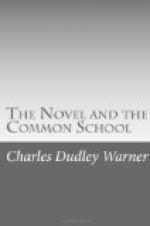The notion that literature can be taken up as a branch of education, and learned at the proper time and when studies permit, is one of the most farcical in our scheme of education. It is only matched in absurdity by the other current idea, that literature is something separate and apart from general knowledge. Here is the whole body of accumulated thought and experience of all the ages, which indeed forms our present life and explains it, existing partly in tradition and training, but more largely in books; and most teachers think, and most pupils are led to believe, that this most important former of the mind, maker of character, and guide to action can be acquired in a certain number of lessons out of a textbook! Because this is so, young men and young women come up to college almost absolutely ignorant of the history of their race and of the ideas that have made our civilization. Some of them have never read a book, except the text-books on the specialties in which they have prepared themselves for examination. We have a saying concerning people whose minds appear to be made up of dry, isolated facts, that they have no atmosphere. Well, literature is the atmosphere. In it we live, and move, and have our being, intellectually. The first lesson read to, or read by, the child should begin to put him in relation with the world and the thought of the world. This cannot be done except by the living teacher. No text-book, no one reading-book or series of reading-books, will do it. If the teacher is only the text-book orally delivered, the teacher is an uninspired machine. We must revise our notions of the function of the teacher for the beginners. The teacher is to present evidence of truth, beauty, art. Where will he or she find it? Why, in experimental science, if you please, in history, but, in short, in good literature, using the word in its broadest sense. The object in selecting reading for children is to make it impossible for them to see any evidence except the best. That is the teacher’s business, and how few understand their business! How few are educated! In the best literature we find truth about the world, about human nature; and hence, if children read that, they read what their experience will verify. I am told that publishers are largely at fault for the quality of the reading used in schools—that schools would gladly receive the good literature if they could get it. But I do not know, in this case, how much the demand has to do with the supply. I am certain, however, that educated teachers would use only the best means for forming the minds and enlightening the understanding of their pupils. It must be kept in mind that reading, silent reading done by the scholar, is not learning signs and calling words; it is getting thought. If children are to get thought, they should be served with the best—that which will not only be true, but appeal so naturally to their minds that they will prefer it to all meaner stuff. If it is true that children cannot acquire this taste at home—and it is true for the vast majority of American children—then it must be given in the public schools. To give it is not to interrupt the acquisition of other knowledge; it is literally to open the door to all knowledge.




